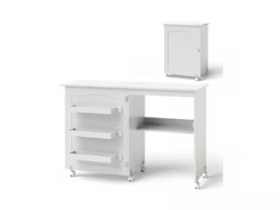Essentials of Camping Generators
Camping generators are useful for bringing the comfort of electricity to your outdoor adventures. They offer a reliable power source for running essential devices and making camping trips more enjoyable and convenient.
Understanding Generators for Camping
Camping generators provide power by converting fuel into electricity. You generally have options like gasoline, diesel, or propane models. Each type offers different benefits, such as fuel efficiency or ease of refueling.
It’s crucial to choose a generator designed for outdoor use, as these models are built to work well in less predictable environments. Noise level is another factor to consider, especially if you want a quiet camping experience.
Types of Camping Generators
Camping generators come in various types, each suited for specific needs. Portable generators are a popular choice because they balance size and power output well. You can also consider inverter generators, which are quieter and more fuel-efficient than regular ones.
Solar generators are another eco-friendly option, using sunlight to generate electricity and perfect for sunny campsites. Understanding these types helps you pick a generator that meets your camping requirements effectively.
Assessing Power Needs for Your Trip
Determining your power needs is critical before selecting a generator. Make a list of all devices you plan to power, like lights, grills, or electronic gadgets, and check their wattage requirements. Smaller generators are fine for lights and phones but might not support larger appliances like mini-fridges.
Understanding the capacity and wattage of your generator ensures you don’t overload it. For longer trips, consider models with high fuel efficiency so you don’t have to refuel frequently. Being clear about these needs aids in selecting a generator that matches your camping plans.
The Perks of Portable Power
Portable power solutions can make your camping trips more enjoyable and convenient. With options like traditional and solar-powered generators, you can find something that fits your needs and ensures you have power wherever you go.
Advantages of Portable Generators
Using a portable generator for camping comes with several benefits. One of the main perks is versatility. You can run various electrical devices, from lamps to small appliances, making your outdoor stay much more comfortable. These generators are especially useful in remote locations where regular power is unavailable.
Portable generators often come with features like multiple outlets and fuel-efficient designs. This means you can power several devices at once and enjoy longer runtime before needing a refill. It’s like bringing a small slice of home with you.
Eco-Friendly Options: Solar Generators
Solar generators are a great eco-friendly alternative for camping. As they rely on solar panels, they harness energy from the sun, making them a clean and renewable power source. This reduces your carbon footprint and eliminates the need for fuel, offering a quieter experience with no emissions or toxic fumes.
Many solar generators come with a compact design that makes them easy to carry and store. They’re often equipped with efficient solar panels that quickly recharge in sunlight. Although their initial cost may be higher, you save money over time as you don’t have to buy fuel.
Sizing and Portability
When you think about portability, the size and weight of the generator matter a lot. A compact design ensures it can easily fit in your vehicle or camping gear. Some models feature handles or wheels, making them easy to transport just about anywhere.
Fuel tank capacity and runtime are important too. Choose a model that fits your power needs without adding unnecessary bulk. While some options are small and suitable for quick trips, others offer higher output for longer stays. A well-chosen generator won’t weigh you down, allowing you to focus on enjoying your adventure.
Generator Safety and Maintenance
When camping, using a generator can provide reliable power and serve as an essential tool, especially in remote locations. To ensure a safe and trouble-free experience, attention to safety features and regular maintenance is crucial.
Operating a Generator Safely
To keep your camping adventure safe, always operate your generator in a well-ventilated area. This helps prevent carbon monoxide buildup, which can be dangerous. Never use a generator inside tents, RVs, or enclosed spaces.
Make sure your generator is equipped with safety features like automatic shutoff. Before starting, inspect for any fuel leaks or loose connections. Keep fuel stored securely in a proper container away from the generator to reduce fire risk.
Always follow the user manual for each specific model you use, as different generators have unique guidelines. Listening for unusual noises can help spot potential issues early. Consider using a quiet generator for minimal noise disruption while camping.
Keeping Your Generator in Top Condition
Regular maintenance extends the life of your generator, ensuring reliable power when you need it. Begin with checking oil levels before every use. Replace the oil as needed and keep filters clean to enhance performance.
Record running hours in a logbook for consistent maintenance checks. Tighten any loose bolts to counteract vibration effects. Weekly checks on the generator’s safety shutoffs ensure they’re functioning correctly.
During long camping trips, it’s essential to watch for overheating, especially during peak loads. Ensure all parts are functioning by turning off the generator, letting it cool down, and giving it a thorough visual inspection. Following these steps will help in maintaining a dependable and efficient power source for your adventures.
Reducing Environmental and Noise Impact
Using generators during camping can make your adventure comfortable, but it can also affect the environment and disturb others. By choosing eco-friendly options and focusing on quiet operation, you can minimize these impacts.
Eco-Friendly Camping with Generators
When camping, it’s important to select a generator that is eco-friendly. Models like the Honda EU2200i, Yamaha EF2000ISV2, and WEN 56200i use inverter technology, which reduces emissions. This makes them kind to nature and easy on fuel consumption. To further lessen impact, use the generator sparingly and switch it off when not needed.
Place the generator on stable ground to avoid spills and always have a spill kit ready. Choosing a fuel-efficient model helps in cutting down on waste. Additionally, adopting sustainable practices such as packing out trash and using renewable energy sources, like solar panels, can make your camping trip even more environmentally friendly.
Minimizing Noise During Your Adventures
To keep noise levels low, opt for a quiet camping generator. Models like the Honda EU2200i and Yamaha EF2000ISV2 are known for their quiet operation, keeping noise pollution to a minimum. Installing noise-reduction mats can also absorb vibrations, making the campsite more peaceful.
Respect quiet hours at campgrounds. Position your generator away from tents and other campers to further reduce disturbance. Using a noise-reduction cover specifically designed for your generator can also help. Regular maintenance ensures your generator runs smoothly, minimizing the sound it produces. Take these steps and enjoy a peaceful environment on your camping adventure.
Enhancing Your Camping Experience
To make the most of your camping adventures, having the right generator and accessories can make all the difference. It’s important to match your gear to your style, whether you’re camping with a family or just want a quiet escape.
Choosing the Right Accessories
Selecting the right accessories is key to making your camping trip more enjoyable. Power strips can help you connect multiple small appliances, while extension cords ensure you have the reach needed in different setups.
Consider rechargeable batteries for devices like lanterns, GPS units, or fans. These not only save space but allow easy recharging using your generator. Solar panels can be a great add-on for eco-friendly power when camping in remote locations.
If you’re using a generator with an RV or travel trailer, make sure it has an appropriate hookup. Adapters might be necessary for connecting different plugs. By preparing these essentials, you’ll be unplugging more conveniently during your outdoor adventures.
Generator Tips for Different Camping Styles
Your choice of generator will depend on your camping style. For free camping in the wilderness, a quiet inverter generator keeps noise levels low, maintaining the peace and quiet of nature. Outdoor enthusiasts often prefer fuel-efficient models for extended trips, reducing the need for frequent refueling.
For family trips with RVs or travel trailers, opt for a high-wattage RV generator to meet the power needs of larger groups and various devices. Make sure the generator’s decibel rating aligns with any regulations in the area to avoid disturbing other campers.
Understanding the power needs of your camping gear can optimize your experience. Proper usage will ensure your generator is a reliable part of your camping toolkit, enhancing your outdoor adventures.







Leave a Reply